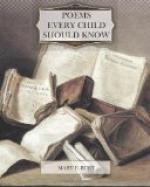A violet by a mossy stone
Half-hidden from
the eye!
Fair as a star, when only
one
Is shining in
the sky.
She lived unknown, and few
could know
When Lucy ceased
to be;
But she is in her grave, and,
oh,
The difference
to me!
WILLIAM WORDSWORTH.
SOLITUDE.
Happy the man, whose wish
and care
A few paternal acres bound,
Content to breathe his native
air
In
his own ground.
Whose herds with milk, whose
fields with bread,
Whose flocks supply him with
attire;
Whose trees in summer yield
him shade,
In
winter fire.
Blest, who can unconcern’dly
find
Hours, days, and years slide
soft away
In health of body, peace of
mind,
Quiet
by day,
Sound sleep by night; study
and ease
Together mixt, sweet recreation,
And innocence, which most
does please
With
meditation.
Thus let me live, unseen,
unknown;
Thus unlamented let me die;
Steal from the world, and
not a stone
Tell
where I lie.
ALEXANDER POPE.
JOHN ANDERSON
“John Anderson,” by Robert Burns (1759-96). This poem is included to please several teachers.
John Anderson, my jo, John,
When we were first acquent
Your locks were like the raven,
Your bonnie brow was brent;
But now your brow is bald,
John,
Your locks are like the snow;
But blessings on your frosty
pow,
John Anderson, my jo.
John Anderson, my jo, John,
We clamb the hill thegither,
And mony a canty day, John,
We’ve had wi’
ane anither;
Now we maun totter down, John,
But hand in hand we’ll
go,
And sleep thegither at the
foot,
John Anderson, my jo.
ROBERT BURNS.
THE GOD OF MUSIC.
“The God of Music,” by Edith M. Thomas, an Ohio poetess now living. In this sonnet the poetess has touched the power of Wordsworth or Keats and placed herself among the immortals.
The God of Music dwelleth
out of doors.
All seasons through his minstrelsy
we meet,
Breathing by field and covert
haunting-sweet
From organ-lofts in forests
old he pours:
A solemn harmony: on
leafy floors
To smooth autumnal pipes he
moves his feet,
Or with the tingling plectrum
of the sleet
In winter keen beats out his
thrilling scores.
Leave me the reed unplucked
beside the stream.
And he will stoop and fill
it with the breeze;
Leave me the viol’s
frame in secret trees,
Unwrought, and it shall wake
a druid theme;
Leave me the whispering shell
on Nereid shores.
The God of Music dwelleth
out of doors.
EDITH M. THOMAS.




